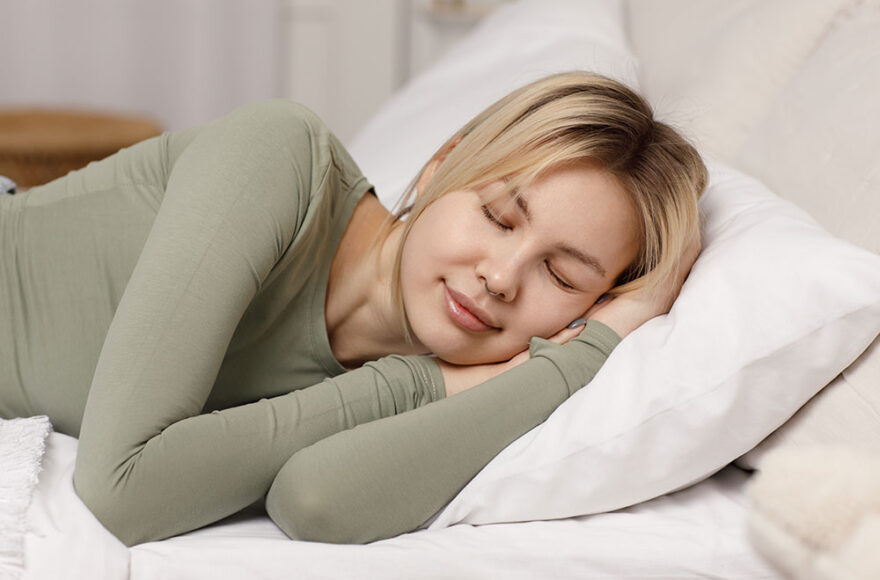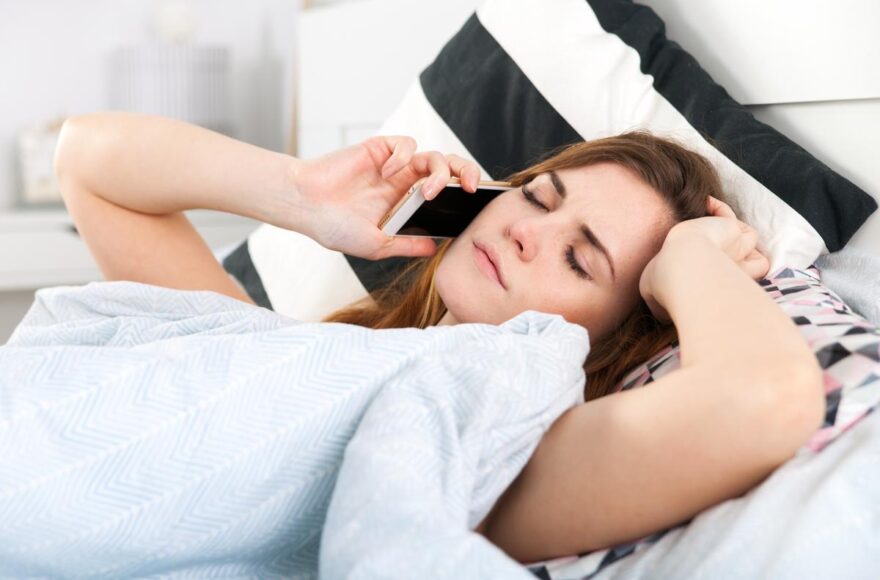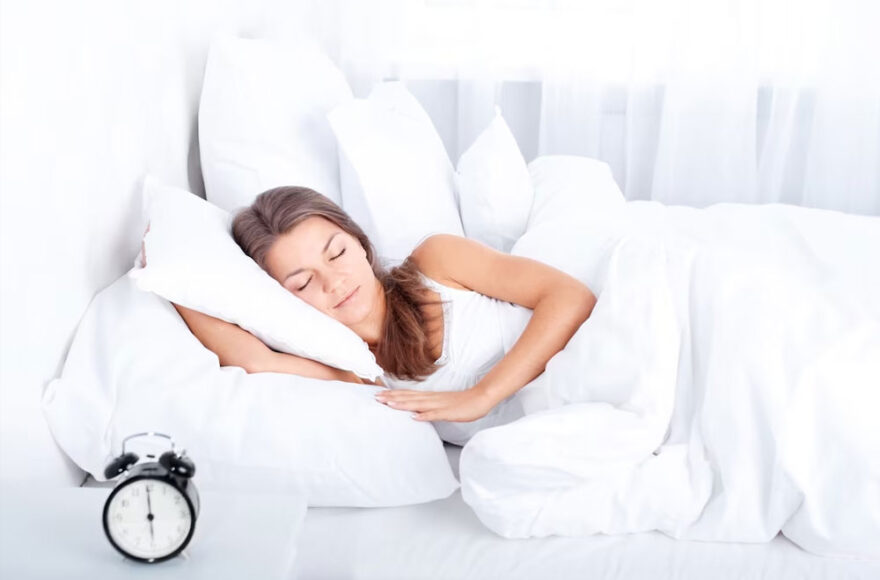Sleep is vital for teenagers’ health Here is a detailed guide to help them sleep better

Table of Contents
- Overview
- Why do teens need more sleep than younger kids?
- 1. For thinking and academic performance.
- 2. For emotional health.
- 3. For good physical health and development.
- 4.For decision-making and risky behavior.
- Why is it challenging for teens to get good sleep?
- 1. Delayed sleep schedule and school times.
- 2. Time demands.
- 3. Use of electronic devices.
- 4. Sleep disorders.
- 5. Mental health conditions.
- How can teenagers get enough sleep?
- How can parents help teenagers to get enough sleep?
Overview
Teenagers are titled night owls and face challenges in getting better sleep. Sleep is vital for teenagers’ health. Here is a detailed guide to help them sleep better.
Sleep is essential for teenagers as it helps support their physical, mental, and emotional development. Most teens should get between 8 and 10 hours of sleep per night. But they face many challenges in getting a night of good sleep. This is because teenagers are in puberty and undergo hormonal and physical changes. These changes can affect their mental, physical, and emotional health.
However, parents can help their teens get enough sleep, establish healthy sleep habits, and prioritize sleep. Setting the bedtime routine, creating a relaxing sleep environment, and restricting the cell or tab use before bedtime can help. Also, talk to your teenager about the importance of sleep and how it affects their health. Help your teens with their weekly schedule to cope with their social life and academic performance.
Why do teens need more sleep than younger kids?
Experts recommend that teens between 13 and 18 get 8 to 10 hours of sleep per night. Teens require more sleep than younger children because their bodies and brains are still developing. They need quality sleep for growth and development. For example, during adolescence, the teen’s brain undergoes significant changes in structure and function. These changes can impact sleep patterns. In teens, the circadian rhythm, or internal biological clock, tends to shift later. This makes it challenging for them to fall asleep at earlier times.
Also, teenagers experience many physical, emotional, and social changes during their teenage. These changes can lead to increased sleep needs. For example, teens may experience growth spurts, hormonal changes, and increased physical activity. These all can increase the body’s need for quality sleep. Quality sleep can help them cope with these changes.
Academic and social pressures can also
impact their sleep. Such as increased homework demands, extracurricular activities, and social events. Quality sleep can help teens to meet increased body sleep needs. By getting enough sleep, teens can support their physical, emotional, and cognitive health and set the stage for healthy habits that can last a lifetime. Below we share all other reasons why teens require more sleep.
1. For thinking and academic performance.
Sleep is vital for brain health, promotes focus and memory, and helps solve problems. It makes teenagers’ brains think sharper and collect critical information to consolidate learning. Sleep also helps teens with expansive thinking. This can help to spur new ideas. Sleep is essential for teenagers whether they are studying for a test, learning a new instrument, or job skills.
Teens who do short sleep may experience drowsiness and be less focused. This will can make a harmful impact on their school performance. Here are some problems associated with lack of sleep in teens include:
- Decreased focus. Lack of sleep can make teens unable to concentrate, which is vital for learning and academic performance.
- Impaired memory. When we sleep, the brain processes all day information and stores it. But lack of sleep, memories may not be properly formed. And it makes it hard for teens to recall stored information.
- Slowed processing. Short sleep may reduce sharpness, and teens may be unable to give a quick answer.
- Reduced creativity. Some research suggests that poor sleep can reduce creativity. Teens may fail to give new ideas and thoughts.
- Impaired sequential thinking. Poor sleep can reduce the teen’s ability to remember an order of steps. For example, when playing an instrument or doing a science experiment.
2. For emotional health.
A whole night of quality sleep is vital for emotional health. Sleep helps to store memories and regulate emotions and mood. Teens with poor sleep may experience mood swings. They are undergoing hormonal changes. This makes it challenging to control their emotions. Over time it affects those teens who have new social relationships. Teenagers who do not get a whole night’s sleep may experience mental health problems.
- Irritability and mood. A night of quality sleep is vital for regulating mood. Teens who fail to get enough sleep are irritable or upset.
- Depression and Anxiety: Over time, poor sleep can cause depression and anxiety in teens. Sometimes it is more severe and causes suicidal thoughts and behaviors in teens.
Taking a whole night’s sleep and practicing good sleep hygiene can help prevent and manage these mental health problems in teens.
3. For good physical health and development.
Sleep plays a crucial role in physical health and development in teens. Here are some of the ways that sleep can support physical health and development in teens:
- Growth and Development. During sleep, the body releases hormones essential for teen growth and development.
- Immune Function. Sleep boosts immune function and helps the body produce proteins(cytokines) that help fight infection and inflammation. Teens who get enough sleep may have a strong immune system and be less likely to get sick.
Poor sleep can have adverse effects on physical development during the teenage. For example, researchers have found that teens who fail to get enough sleep have metabolic and cardiovascular problems. They may have high blood pressure, cholesterol levels, and insulin resistance.
4.For decision-making and risky behavior.
Getting enough sleep can help improve decision-making and behavior in teenagers. Also, adequate sleep can improve impulsive control. It is essential for making decisions and routine habits. Teens who do not get enough sleep may be more likely to engage in high-risk behaviors like drug and alcohol use.
For example, texting while driving, drunk driving, failing to use a seatbelt, and riding a bicycle without a helmet. Also, poor sleep can make teens more prone to use drugs and alcohol. It can make them smoke, engage in risky sexual behavior, fight, and carry weapons. Behavioral problems can badly affect teens’ ties with their family and friends. Plus, teens can get poor grades in school.
Why is it challenging for teens to get good sleep?
Some teens may face challenges in getting enough sleep for several reasons, which may vary from teenager to teenager.
1. Delayed sleep schedule and school times.
During teenage, there is a natural shift in the timing of the body’s internal clock, or circadian rhythm. This makes it more difficult for teens to fall asleep early in the evening and wake up early before school. Teens feel tired and sleep-deprived the next day. Delayed sleep can increase the tendency in teens to become night owls, staying up late at night and sleeping longer in the morning. During puberty, teenagers are on a roller coaster of hormones.
They feel several changes in their body and habits. It also affects the release of the sleep hormone melatonin. Teens do not start to feel tired until late in the evening. The body starts producing melatonin later in the day. It helps them to fall asleep and sleep till the late hours of the morning.
Even if you allow your teen to sleep on their own schedule, they will get eight hours or more per night. For example, sleeping from 11 p.m. or midnight until 8 a.m. or 9 a.m. can help teenagers to get enough sleep. But mostly, school starts timings are around 8 a.m. or 9 a.m., which can make them wake up early. So many teens can get enough sleep and still arrive at school on time. Most teens try to catch more sleep at weekends. But it worse their delayed sleep schedule and makes them difficult to fall asleep on weekdays.
2. Time demands.
Many teens have a busy weekly schedule. Like they have school assignments, sports, work responsibilities, house chores, and social life. These things require attention and get a big chunk of their time. They are so busy doing all these things, which leaves little time for sleep.
For example, teens may stay late to finish their homework or assignment. Or, hanging out with friends on weekends can make teens night owls. Also, teens feel so stressed about completing their goals. Stress or anxiety makes them sleep less and may cause sleep disorders.
3. Use of electronic devices.
Many teens can use electronic devices late at night, making it difficult to fall asleep and stay asleep. These devices can emit blue light, which suppresses the production of melatonin. Melatonin is vital to promote sleep and cues your body to fall asleep. While teens who use cell phones, tabs, or laptops in bed may find difficulty falling asleep. Blue light cues your brain to stay awake and keep you stimulated. This can also cause sleep problems if teens use phones regularly in their beds.
4. Sleep disorders.
Some teens may not get enough sleep due to sleep disorders. For example, obstructive sleep apnea (OSA) causes repeated pauses in breathing during sleep. OSA can disturb sleep and cause excessive daytime sleepiness. Though rare, teens can have sleep disorders like restless legs syndrome. This condition involves a strong urge to move the limbs when lying down. Other sleep disorders like narcolepsy can also affect the sleep-wake cycle in teens.
5. Mental health conditions.
Teens with certain mental health conditions may have difficulty falling asleep. Depression and anxiety are common problems that can make teens challenging to fall or stay asleep. Also, poor sleep cause these conditions and other mental health problems.
How can teenagers get enough sleep?
- Budgeting eight hours of sleep into your daily schedule. Also, keep that schedule the same on weekdays and weekends.
- Create a relaxing bedtime routine for relaxation that cues your body to fall asleep fast.
- You may choose relaxing things before bed, for example, have a bath and a hot milky drink. Or use meditation or mindfulness activities such as gentle yoga may also help to fall asleep.
- Avoid drinking caffeine and energy drinks in the afternoon and evening. Because caffeine is a stimulant that keeps your brain active, and you may have trouble falling asleep.
- Turn off the TV and other electronic devices at least an hour before bedtime.
- Avoid using smartphones, tabs, and laptops in your bed. Keep them on silent mode and avoid checking them during the night.
- Keep your bedroom cool, dark, and quiet place. Install dark curtains to restrict the light.
- Get the best mattress and pillows for a good night’s sleep.
- You can use a pedestal fan or white noise machine to reduce the external noise.
- Do exercise during the day so you are more physically tired at night. But not two hours before bedtime. The postworkout energy keeps you active at night.
- Try to keep your sleep and wake-up time the same every day.
- Avoid staying up late on the weekends. It will keep you drowsy on Monday morning.
- Practice the same bedtime routine every night for at least four weeks.
- Start your bedtime routine 10 minutes earlier than usual after four weeks. This will add an extra 10 minutes to your bedtime.
How can parents help teenagers to get enough sleep?
- Set a regular sleep schedule for teens. Keep their bed and wake time the same daily, including on weekends.
- Talk to them and set time limits for any stimulating activity, such as screen time or homework.
- Encourage relaxing activities during the evening, such as reading, bathing, and drinking warm milk.
- Make your teenager’s room quiet, cool, and dark. Remove any distractions, such as electronic devices, and encourage them to use the bedroom only for sleeping.
- Help your teenager schedule their after-school commitments for time to get rest and sleep.
- Encourage your teen to take an afternoon nap after school to help recharge their battery if they have time.
- Sit your teenager and set their weekly schedule, and help them to trim activities, if they are overcommitted.
- Avoid early morning classes, training sessions, or appointments for your teenagers.
- Talk to your teenager about how sleep is vital for their health and help to adjust your teenager’s body clock.





